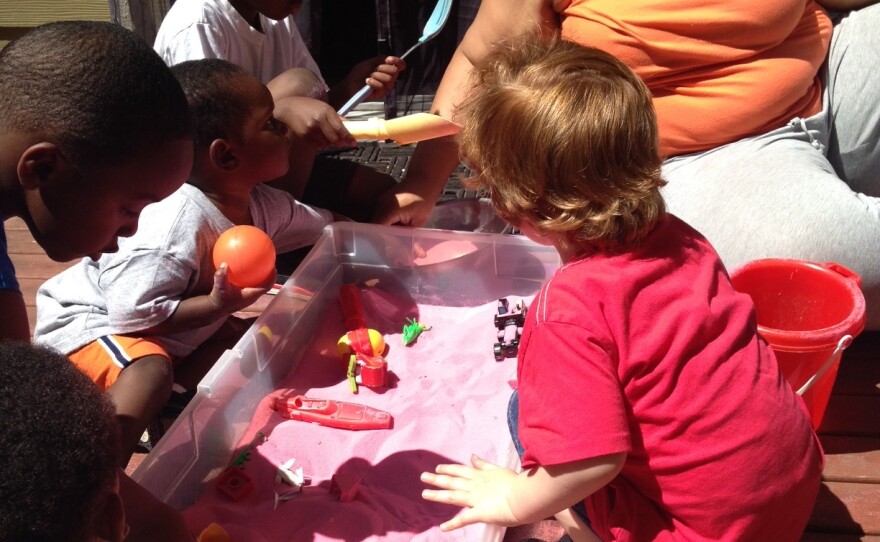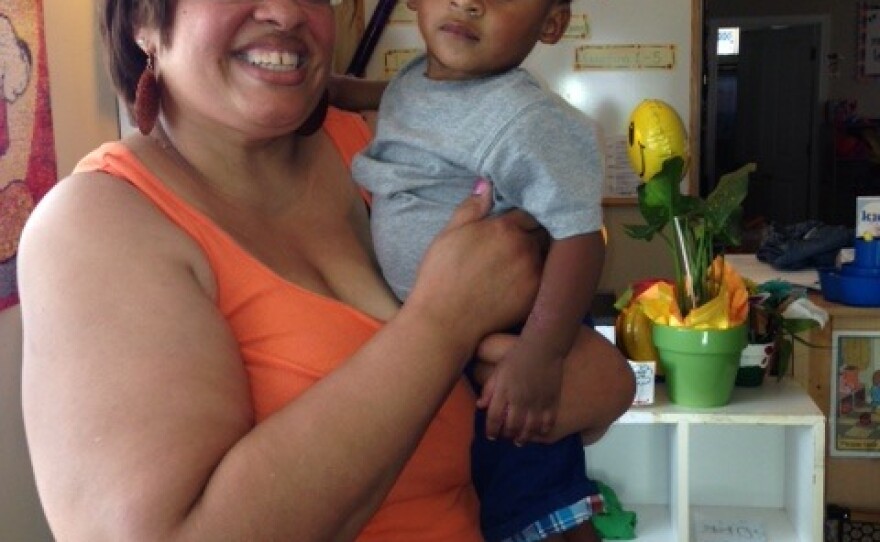Patti Oliver Bailey sat on a sunny wooden deck in Seattle’s Rainier Valley on a recent afternoon, surrounded by toddlers digging through a box of pink sand and bright toys.
She has been a childcare provider for 25 years, operating Patti’s Pandas Childcare Preschool out of her home. Home-based child care makes up about two-thirds of the licensed daycare facilities in Seattle.
Bailey’s days are long. "You are the HR person. You are the maintenance person. You are accounts payable, accounts receivable. You’re the one that goes to get the supplies. You’re the one who cleans up. You are the nurturer, you’re the educator – so I’m balancing hundreds of things every day.”
A new addition to Bailey’s balancing act: This fall’s pair of ballot initiatives that could affect how child care teachers are hired, trained and paid.
A proposal from Mayor Ed Murray and City Council President Tim Burgess would subsidize high-quality preschool for three- and four-year-olds at qualifying centers.
An initiative backed by the Service Employees International Union Local 925 and the American Federation of Teachers Washington would require standardized training and certification for child care workers and raise their minimum wage.
Either measure, if enacted, would bring big changes to the city's child care system, and big questions for providers. Bailey has questions about both proposals.
She wants to know the union initiative would raise child care workers’ minimum wage to $15 an hour at a faster rate than the city's minimum wage hike.
"We have to come to a place to understand how we can pay our employees and our staff $15 minimum wage, because they deserve it. This is hard work," Bailey said. "But how we get there I don’t know."
Bailey said despite her slim profit margin, raising tuition isn’t an option. Many families already rely on state or city subsidies to pay much of their children’s tuition.
"Some of them can’t pay even the co-pay because it’s so expensive to live in Seattle, so we even work with them on that. We give them a break," Bailey said.
Still, she said a higher minimum wage is definitely an issue providers will already have to wrangle with as the city phases in its $15-an-hour law.
Under the city’s new law, big businesses will be the first required to pay $15 an hour. Bailey said small day cares like hers need to be ready to increase pay for their own workers, "so that they don’t go to McDonald’s and work for $15 an hour, instead of educating these little children who deserve our time, our passion, our desire to get them ready for kindergarten.”
Bailey said teacher turnover is already a problem for a lot of child care facilities. She was lucky to find her one full-time employee.
“She’s been with me for over eight years now, and I couldn’t see myself being even without her help," Bailey said, choking back tears. "You don’t have that many people who are committed and that loyal to the work, the children, and the families, and that’s important to us.”
One way to increase worker pay could be to qualify for the bigger subsidies that would come with the city’s proposed preschool program. However, that requires teachers to either have, or be working toward bachelor’s degrees – which Bailey and her staff lack.
Bailey said she and her head teacher attend weekly continuing education classes to comply with state and local subsidy requirements. "My work starts at 7 o'clock in the morning and it ends some nights at 7 o'clock in the evening. You have to wonder how they expect us who teach children every day to attain a bachelor’s degree. How do we get to that point?”
If voters say yes to the Seattle Preschool Program, only a small number of preschool teachers would need bachelor’s degrees, because the program would only serve up to two thousand students at a time.
But Bailey says that raises other questions.
“I know that there are over 30,000 children in the greater Seattle area who need to be served," Bailey said. "What happens to all of the other children and we’re just concentrating on 2,000 children at this time?"
No matter what, Bailey said, it’s important to her to provide low-income families the care she sought when she had small children.
"One of the reasons I went into it was even though I couldn’t afford to pay top dollar, I still wanted to take my children to a place that I would have peace of mind about they’re getting nurtured, where they're getting educated and taken care of. So this is the same thing that we’ve offered these families," Bailey said.



